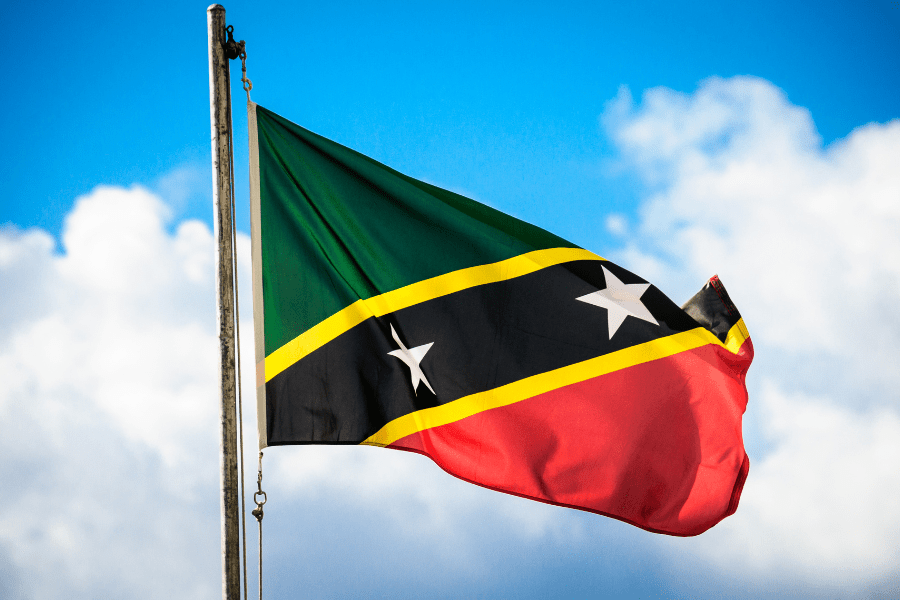Banking in St. Kitts and Nevis: The Ultimate Guide 2025
January 6, 2025
St Kitts and Nevis is a stunning tropical island paradise, famous for its friendly locals, pristine white sands and turquoise Caribbean waters.
It’s also a popular jurisdiction for offshore trusts and its citizenship-by-investment (CBI) program for those seeking lifestyle and tax benefits.
Anyone deciding that the warm weather, storied history and laid-back lifestyle in St Kitts is for them will be joining a vibrant and supportive expat community.
So, whether you’re interested in a second passport through its CBI program or simply want residence to live and work in the idyllic island nation, one of the first steps is to open a bank account.
To do that, you need to know how banking in St Kitts and Nevis works, including which banks are the easiest to access for foreigners and what documents are required.
The in-depth guide covers it all below, but if you want to learn more about moving offshore and saving taxes with a second citizenship or if you need help sorting your paperwork, preparing immigration documents and setting up foreign bank accounts, simply get in touch with our expert team.
Why Bank in St Kitts and Nevis?
Tucked away in the Eastern Caribbean’s Leeward Islands chain, St Kitts and Nevis is a nation of two islands, each with its own unique allure.
With around 53,000 residents speaking English, this picturesque country gained independence from Britain in 1983. The capital, Basseterre, is the lively heart of the nation.
As far as banking and the local economy goes, St Kitts and Nevis uses the East Caribbean dollar (XCD), a currency shared with seven other neighbouring countries.
This currency is managed by the Eastern Caribbean Central Bank, conveniently located right in Basseterre. The bank plays a key role in ensuring the financial stability of the islands.
Other factors that contribute to the security of banking in St Kitts and Nevis include its membership of the Organisation of Eastern Caribbean States (OECS) which promotes economic harmonisation with nearby countries.

Who Needs to Open a St Kitts and Nevis Bank Account?
Aside from applicants to the St Kitts and Nevis citizenship-by-investment program, regular expatriates and retirees looking to relocate to these tropical islands will also benefit from local banking services.
As with many former colonies in the region, the traditional main driver of the economy was the country’s now-defunct sugar industry.
After the government shut down the last of its national sugar production plants in 2005, it started running up high levels of debt.
To offset this, the government began competing strongly to attract wealthy investors through its citizenship-by-investment program.
But before enjoying the perks of the program, which include a favourable tax regime and a passport offering visa-free travel throughout the EU and the UK, you will need to open a St Kitts bank account.
Types of Bank Accounts in St Kitts and Nevis
There are five types of bank accounts available in St Kitts and Nevis:
- Savings account: These can offer either a term deposit or a fixed deposit and can be opened for a duration of three, six or twelve months. With a regular savings account, you can earn interest payable each quarter. With a target savings account, you can set up an automatic transfer at set intervals. This will transfer money from another bank account into your savings account until a set target has been reached.
- Current account: You can also open a current account, making it easier to accept payments, transfer money in and out of the account, and set up auto payments to pay bills by direct debit. This can be set up automatically and managed by online banking. You also have overdraft and debit card functionality.
- Escrow account: Escrow accounts are used specifically for buying property. The payment is agreed upon in advance with a property developer and then held in escrow. The payment is only transferred to the developer once all contractual obligations have been met, and is then sent from the escrow account to the seller of the property by bank transfer.
- Merchant account: A special type of account for companies who wish to make and receive electronic payments, including credit card payments.
- Foreign currency account: St Kitts banks also allow you to open accounts in the following currencies:
- Australian Dollar (AUD)
- British Pound Sterling (GBP)
- Canadian Dollar (CAD)
- Euro (EUR)
- Hong Kong Dollar (HKD)
- Japanese Yen (JPY)
- Singapore Dollar (SGD)
- Swiss Franc (CHF)
- UAE Dirham (AED)
- US Dollar (USD)
Online Banking
Online banking and mobile banking services are widely available in St Kitts and Nevis though exact features may vary. Therefore, you are advised to discuss it with the bank in advance to ensure their service fits your specific needs.

Banking Options in St Kitts and Nevis
Unlike some other offshore jurisdictions, there aren’t as many international banks in St Kitts. Indeed the overall number of financial institutions in the country is quite low when compared to the Cayman Islands, for example.
As mentioned, all banks in St Kitts and Nevis are regulated by the Eastern Caribbean Central Bank in Basseterre.
Here are the main banking options in the country:
- Bank of Nevis (BON): Founded in 1985, Bank of Nevis Ltd. is a member of the Caribbean Association of Banks. It offers both personal and business banking, including wire transfer and online banking services. In 2019, it entered into an agreement to take over banking operations for both the Royal Bank of Canada and RBTT Bank of Trinidad and Tobago within the country.
- CIBC Bank: Also known as First Caribbean International Bank, it’s part of Canada’s CIBC group. The bank was formed in 2002 when the CIBC Group’s regional subsidiary merged with its Barclay’s Caribbean counterpart. It has branches throughout the Caribbean, including one in St Kitts. It offers personal and business banking, as well as corporate and investment banking services.
- Hamilton Reserve Bank: This bank was named after Nevis-born Alexander Hamilton, who became one of the founding fathers of the United States. It offers a range of personal, business and private banking services. It also offers escrow accounts and foreign currency accounts, plus fast international money transfers, making it popular with international investors and other foreign customers.
- Republic Bank: This is a Caribbean bank with operations in six locations throughout the region, including St Kitts and Nevis. In 2018, the group took over the Eastern Caribbean operations of the Canadian banking group Scotiabank. In 2022, the company upgraded its online banking services. It offers a range of account types, including chequing, savings and foreign currency accounts.
- SKNA: Is the abbreviation for St Kitts-Nevis-Anguilla-National Bank. Founded in 1971, it is the oldest national bank in the country. It’s also the largest bank in St Kitts and Nevis and offers both personal and commercial banking services. As a national bank, it’s known for providing business development loans.
How to Open a Bank Account in St Kitts and Nevis
To open a bank account in Saint Kitts and Nevis you will need to provide a form of ID and a proof of address
You will also need to complete an application form.
For ID, you can use an official national photo ID, but we always recommend you use your passport.
Your proof of address can be a utility bill or some other form of official correspondence ideally with a postmarked envelope.
Other Bank Requirements
The bank may also ask you to provide additional documents to ascertain exactly why you wish to open a bank account in St Kitts and Nevis.
For example, if you are applying for citizenship by investment, they will require full details about the nature of your investment and how much you have to invest. You may also be asked to provide references to show that you are of good standing.
It’s also a good idea to bring some recent bank statements. These help demonstrate that you are a person of means and may also be accepted as proof of address.
Preparing and compiling documents to open a bank account can take time. And that time can add up, getting in the way of what matters.
But as a Nomad Capitalist client, you don’t have to sweat the small stuff because we do all the legwork for you.
Banking in St Kitts and Nevis: FAQs
Yes, foreigners are allowed to open new accounts, though it does depend on the bank in question. Nevis Cooperative Credit Union, for example, is one of the local financial institutions which only allows locals to join and limits foreign transfers.
Currently, there are at least 15 banks, including both local and international banks, present on the island nation.
To open a bank account in St Kitts, you’ll need a current passport or government-issued photo ID, proof of residential address and a completed application including your statement of purpose for the account. Banks can request other documentation, however, depending on the type of account you are opening.
No. Banks in St Kitts and Nevis do not accept cryptocurrency. While crypto is accepted as a source of funds, it cannot be used as currency to purchase items or open a bank account.
Is St Kitts and Nevis the Right Choice for You?
If you plan to live or work there, banking in St Kitts and Nevis offers plenty of advantages, from a stable financial environment to strong confidentiality policies.
These features make it an attractive destination for those seeking to diversify their financial holdings or gain a foothold in the Caribbean market.
But how do you know if opening a bank account or pursuing citizenship here aligns with your goals?
At Nomad Capitalist, our team can guide you in assessing your personal and financial goals to determine if St Kitts and Nevis is the right choice.
Whether you’re considering the benefits of local banking or exploring the popular citizenship-by-investment program, we’re here to provide expert insights tailored to your unique situation.
We’ve successfully assisted thousands of seven- and eight-figure entrepreneurs in making strategic financial decisions and are confident we can help you navigate the process.
To explore how St Kitts and Nevis might fit into your financial future, reach out today.


The Best Countries for Investing in the Middle East 2025
The global investment landscape has changed dramatically. Gone are the days when opportunities were limited by geography or confined to traditional stocks and bonds sold only through standardised, rigid and often cumbersome channels. Back then, going ‘global’ might have just meant adding a few European equities to a US-based portfolio. Today, everything has changed. Barriers […]
Read more

Best Gulf Country for Company Formation and Business Setup
For ambitious entrepreneurs, the Gulf region offers a powerful blend of top-tier banking systems and business-friendly laws that streamline company formation and make the process remarkably efficient. Countries like Bahrain, Kuwait, Oman, Qatar, Saudi Arabia and the United Arab Emirates (UAE) are actively competing to attract the world’s brightest business minds – and it’s working. […]
Read more

Top Offshore Tax Havens in the Caribbean
When people hear the term ‘tax haven’, it often conjures up images of shadowy offshore bank accounts and shady financial dealings. The reality is far more practical and much less sinister. Caribbean tax havens aren’t just for billionaires or corporations with armies of lawyers. In fact, many everyday entrepreneurs and investors take advantage of the […]
Read more




